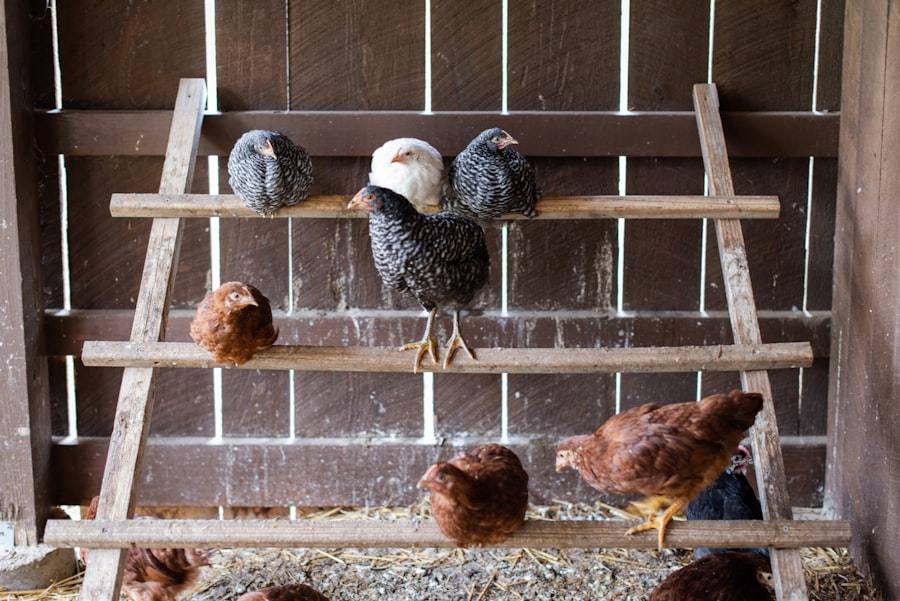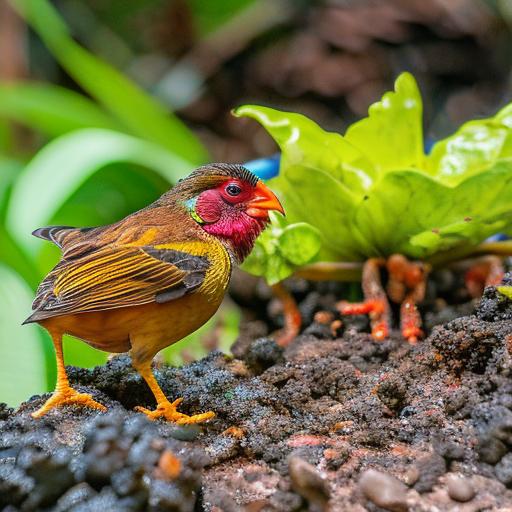Backyard keeping of chickens and bees has become increasingly popular in Hawaii in recent years. This trend is driven by the desire for sustainable living, self-sufficiency, and the numerous benefits that come with raising these animals in your own backyard. In this article, we will explore the advantages of backyard chicken and beekeeping in Hawaii, as well as the legal requirements, preparation, building a chicken coop, choosing the right breeds, feeding and care, harvesting honey, maximizing egg production, composting with chickens and bees, and conclude with resources for getting started.
Key Takeaways
- Raising chickens and bees in your backyard in Hawaii has numerous benefits
- Legal requirements include permits and zoning laws
- Proper preparation of your backyard is crucial for the safety of your chickens and bees
- Choosing the right chicken breed and providing proper care is important for egg production
- Composting with chicken manure and bee waste can benefit your garden.
Legal Requirements
Before embarking on your backyard chicken and beekeeping journey in Hawaii, it is important to familiarize yourself with the legal requirements. In Hawaii, there are regulations and permits needed for keeping chickens and bees. For chickens, you may need to obtain a permit from your local government or homeowners association. There may also be restrictions on the number of chickens you can keep based on the size of your property. As for bees, you will need to register your beehive with the Hawaii Department of Agriculture and follow their guidelines for beekeeping.
In addition to permits and regulations, it is important to consider zoning and land use laws. Some areas may have restrictions on keeping chickens or bees due to noise or proximity to neighbors. It is essential to check with your local government or homeowners association to ensure that you are in compliance with these laws before starting your backyard chicken and beekeeping venture.
Preparing Your Backyard
Once you have familiarized yourself with the legal requirements, it is time to prepare your backyard for keeping chickens and bees. When choosing the right location for your chicken coop and beehive, consider factors such as sunlight exposure, wind direction, and accessibility. Chickens require a well-drained area with plenty of sunlight for their coop and run. Bees thrive in areas with morning sun exposure and protection from strong winds.
Fencing is an important consideration when preparing your backyard for chickens and bees. A sturdy fence will help keep predators out and protect your animals. For chickens, consider using hardware cloth or chicken wire with small openings to prevent predators from entering. Bees, on the other hand, do not require fencing but should be placed in an area away from foot traffic to minimize disturbances.
Building a Chicken Coop
Building a chicken coop is an essential part of backyard chicken keeping. When choosing the right size and style of chicken coop, consider the number of chickens you plan to keep and the available space in your backyard. The coop should provide enough room for the chickens to move around comfortably, as well as nesting boxes for egg-laying.
Materials and tools needed for constructing a chicken coop include lumber, screws, nails, wire mesh, and roofing materials. It is important to use sturdy materials that can withstand the elements and protect your chickens from predators. The coop should also have proper ventilation to ensure good air circulation and prevent moisture buildup.
Chicken Breeds
Choosing the right chicken breed is an important decision when starting your backyard chicken keeping journey in Hawaii. Some popular chicken breeds for backyard keeping in Hawaii include Rhode Island Reds, Plymouth Rocks, and Leghorns. These breeds are known for their hardiness, egg-laying capabilities, and ability to adapt to Hawaii’s climate.
When choosing a breed, consider factors such as egg production, temperament, and climate suitability. Rhode Island Reds are known for their excellent egg-laying abilities, while Plymouth Rocks are known for their friendly temperament. Leghorns are great for warm climates as they are heat-tolerant and lay white eggs.
Feeding and Care

Proper diet and nutrition are essential for the health and well-being of your chickens and bees. For chickens, a balanced diet should consist of a combination of commercial feed, kitchen scraps, and foraging. Commercial feed should be high in protein and contain essential vitamins and minerals. Kitchen scraps such as fruits, vegetables, and grains can be given as treats, but should not exceed 10% of their diet.
Bees, on the other hand, primarily feed on nectar and pollen from flowers. It is important to provide a diverse range of flowering plants in your backyard to ensure a steady food supply for your bees. Avoid using pesticides or herbicides in your garden as they can be harmful to bees.
Harvesting Honey
Beekeeping basics and harvesting honey are exciting aspects of backyard beekeeping in Hawaii. To harvest honey, you will need the right equipment and techniques. Equipment needed for harvesting honey includes a bee suit, smoker, hive tool, bee brush, and honey extractor.
When harvesting honey, it is important to follow proper techniques to ensure the health and safety of your bees. Begin by smoking the hive to calm the bees, then remove the frames containing honey. Extract the honey from the frames using a honey extractor, and then filter and bottle the honey for storage.
Chicken Egg Production
Maximizing egg production from your backyard chickens is a goal for many chicken keepers in Hawaii. To maximize egg production, provide your chickens with a balanced diet, clean water, and a comfortable environment. Ensure that they have access to nesting boxes for laying eggs and collect eggs regularly to prevent them from becoming dirty or damaged.
To store eggs, it is important to keep them in a cool place away from direct sunlight. Eggs can be stored in the refrigerator for up to one month. Before consuming or selling eggs, it is recommended to wash them with warm water to remove any dirt or bacteria.
Composting with Chickens and Bees
One of the benefits of backyard chicken and beekeeping is the ability to use their waste for composting. Chicken manure is rich in nitrogen and can be added to your compost pile to provide nutrients for your plants. Bee waste, such as beeswax and propolis, can also be added to the compost pile.
Composting with chicken and bee waste helps reduce waste, improve soil fertility, and promote healthy plant growth. The compost can be used in your garden to enrich the soil and provide nutrients for your plants.
In conclusion, backyard keeping of chickens and bees in Hawaii offers numerous benefits, including sustainable living, self-sufficiency, and the production of fresh eggs and honey. However, it is important to familiarize yourself with the legal requirements, prepare your backyard properly, build a suitable chicken coop, choose the right breeds, provide proper feeding and care, harvest honey, maximize egg production, and utilize chicken and bee waste for composting. By following these guidelines and resources for getting started and continuing your backyard farming journey, you can enjoy the rewards of backyard chicken and beekeeping in Hawaii.
If you’re interested in backyard keeping chickens and bees in Hawaii, you might also want to check out this informative article on the mating season for turkeys. Understanding the breeding patterns and behaviors of turkeys can be helpful when planning your backyard flock. You can read more about it here. Additionally, if you’re looking for a practical and space-saving chicken coop design, the A-frame chicken coop is worth considering. Find out more about this popular coop style here. Lastly, if you want to add some charm to your chicken coop while providing them with a convenient feeding station, the Chicken Coop Country Diner is a great option. Learn more about it here. Happy backyard farming!
FAQs
What are the benefits of backyard chicken and bee keeping in Hawaii?
Backyard chicken and bee keeping in Hawaii can provide a sustainable source of fresh eggs and honey, as well as help with pollination of local plants and gardens. It can also be a fun and educational hobby for families and individuals.
What are the regulations for backyard chicken and bee keeping in Hawaii?
In Hawaii, regulations for backyard chicken and bee keeping vary by county. It is important to check with your local government to ensure that you are following all necessary rules and regulations.
What kind of space do I need for backyard chicken and bee keeping in Hawaii?
For backyard chicken and bee keeping in Hawaii, you will need a suitable outdoor space that is secure and protected from predators. Chickens require a coop and a run, while bees require a hive and a flight path.
What kind of care do backyard chickens and bees require in Hawaii?
Backyard chickens and bees in Hawaii require daily care, including feeding, watering, and cleaning. Chickens also require regular egg collection and coop maintenance, while bees require hive inspections and honey harvesting.
What are some common challenges of backyard chicken and bee keeping in Hawaii?
Common challenges of backyard chicken and bee keeping in Hawaii include predators such as mongoose and rats, as well as diseases and parasites that can affect chickens and bees. It is important to be aware of these challenges and take necessary precautions to protect your animals.
Can backyard chicken and bee keeping in Hawaii be done sustainably?
Yes, backyard chicken and bee keeping in Hawaii can be done sustainably by using natural and organic methods for feeding and pest control, as well as practicing responsible hive management and egg production. It is important to prioritize the health and well-being of the animals and the environment.
Meet Walter, the feathered-friend fanatic of Florida! Nestled in the sunshine state, Walter struts through life with his feathered companions, clucking his way to happiness. With a coop that’s fancier than a five-star hotel, he’s the Don Juan of the chicken world. When he’s not teaching his hens to do the cha-cha, you’ll find him in a heated debate with his prized rooster, Sir Clucks-a-Lot. Walter’s poultry passion is no yolk; he’s the sunny-side-up guy you never knew you needed in your flock of friends!







